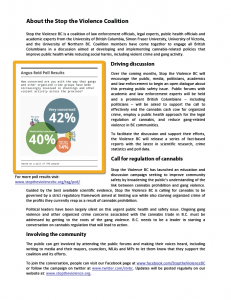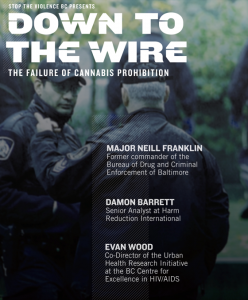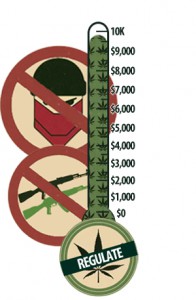New Polls Shows 87% of British Columbians Link Gang Violence to Organized Crime’s Control of Marijuana Trade
October 27, 2011 [Vancouver, Canada] – In the wake of high-profile gang violence related to the illegal marijuana industry in BC, a new coalition of academic, legal and health experts has released the first of a series of reports and polling results aimed at pressuring politicians to legally regulate marijuana sales under a public health framework.
The Angus Reid poll says 87% of BC respondents link gang violence to organized crime’s efforts to control the province’s massive illegal cannabis trade while the report, called Breaking the Silence, clearly demonstrates that cannabis prohibition in BC has been ineffective and caused significant social harms and public safety issues.
“From a scientific and public health perspective we know that making marijuana illegal has not achieved its stated objectives of limiting marijuana supply or rates of use,” said Dr. Evan Wood, a coalition member and Director of the Urban Health Research Initiative at the BC Centre for Excellence in HIV/AIDS. “Given that marijuana prohibition has created a massive financial windfall for violent organized crime groups in BC, we must discuss alternatives to today’s failed laws with a focus on how to decrease violence, remove the illicit industry’s profit motive and improve public health and safety.”
The new coalition, Stop the Violence BC, released the report in tandem with results from an Angus Reid poll that overwhelmingly demonstrates that lawmakers lag far behind public opinion on revamping marijuana laws in BC.
Key Angus Reid Poll Data:
- A mere 12% of British Columbians support keeping current marijuana laws in place
- 81% of British Columbians are concerned about increasing gang violence in BC
- 87% of British Columbians attribute gang violence to drug trafficking groups fighting over profits from the illegal marijuana trade
- 69% state that arresting marijuana producers and sellers is ineffective, and that BC would be better off taxing and regulating the use of marijuana
- More than 75% reject the notion that possession of marijuana should lead to a criminal record
- Only 39% of British Columbians support instituting mandatory minimum prison sentences for marijuana-trade related crime, including possession of six or more marijuana plants.
“These results reveal that British Columbians are clearly dissatisfied with the status quo and recognize the unintended harmful consequences of marijuana prohibition in terms of promoting organized crime and violence,” said Mario Canseco, Vice President, Angus Reid Public Opinion. “The majority of British Columbians are ready for new regulations related to marijuana use and possession, and reject the notion that tough-on-crime measures will be effective.”
Retired RCMP Chief Superintendent Supports Stop the Violence BC
Support for the Stop the Violence BC coalition has been widespread and includes leading experts and professionals from many fields. Vince Cain, retired RCMP Chief Superintendent and former Chief Coroner for British Columbia, has witnessed the devastating human consequences and social and economic costs attributable to marijuana prohibition.
“In BC, organized crime is reaping billions from the illegal marijuana industry and increasingly consolidating its hold through violence,” said Cain. “Stiffer sanctions will not reverse these trends, but legally regulating marijuana in BC would eliminate a primary source of revenue for these criminal groups, reduce gang violence, and generate tax revenue.”
Police Officer: “Prohibition Has Failed”
Police officers are at the front-lines of the futile efforts to control the illegal marijuana trade and the resulting gang violence.
“Marijuana prohibition may be well-intentioned, but my personal opinion is that it has failed in BC and around the world,” said David Bratzer, a police officer who resides in Victoria, BC. “Prohibition has created a huge and violent criminal enterprise that is becoming more dangerous with each passing day, and I strongly support controlled marijuana legalization as an effective way to fight crime and protect our communities.”
A Call for Public Discussion
Over the coming months, Stop the Violence BC will encourage the public, media, politicians, academics and law enforcement to begin an open dialogue about this pressing public safety issue. Public forums with academic and law enforcement experts will be held and further poll results and scientific research will be released. In addition, prominent British Columbians – including politicians – will be asked to support the call to effectively end the marijuana cash cow for organized crime, employ a public health approach for the legal regulation of marijuana, and reduce gang-related violence in BC communities.
“The time has come for all politicians – municipal, provincial and federal – to say whether they agree with public opinion, support reducing gang violence and changing these ineffective and harmful marijuana laws,” said Wood. “The violence is taking place in their communities, so all politicians owe it to their constituents to show real leadership and acknowledge the fact that marijuana prohibition is a key source of crime and gang violence in this province.”
With Vancouver under a police warning regarding the potential for increased gang violence, members of the public wanting to reduce violence and criminal activity can get involved in the coalition’s efforts by attending the public forums and making their voices heard. They can also write to media and their mayors, councilors, MLAs and MPs to let them know that they support the coalition and its efforts.
To join the conversation, please visit our Facebook page. Updates on the campaign are publicly available on our Twitter feed.
-30-
About Stop the Violence BC
Stop the Violence BC is a coalition of law enforcement officials, legal experts, public health officials and academic experts from the University of British Columbia, Simon Fraser University, University of Victoria, and the University of Northern BC. Coalition members have come together to engage all British Columbians in a discussion aimed at developing and implementing marijuana-related policies that improve public health while reducing social harms, including violent crime.
Click here for a full listing of coalition members and to learn more about the coalition.
About Angus Reid Public Opinion
Angus Reid Public Opinion is the Public Affairs practice of Vision Critical headed by Dr. Angus Reid: an industry visionary who has spent more than four decades asking questions to figure out what people feel, how they think and who they will vote for.
Media: to receive polling results and talk to a member of the Stop the Violence BC Coalition, please contact:
Crystal Reinitz
Edelman
604.623.3007 ext. 301
[email protected]
[button link=”https://stoptheviolencebc.org/2011/10/26/poll-british-columbians-link-gang-violence-to-illegal-cannabis-market/” style=”download” color=”orange”]Click here to download poll results[/button]

 “I am 100% behind this report, its findings and its recommendations. The carnage that has been wrought upon Mexico, its people and its institutions, through Calderón’s war on drugs, cannot be solely blamed on prohibition. However, it is my firm belief that the policies of prohibition, especially of marijuana, directly contributed to the over 47,000 people who have been killed in drug-war related violence in this country since 2007. As a former Vancouver Police officer who worked the streets of Vancouver’s Downtown East-side I was directly exposed to the multitude of victims who needlessly suffered for their addictions due to Canada´s prohibitionist stance with regards to marijuana.”
“I am 100% behind this report, its findings and its recommendations. The carnage that has been wrought upon Mexico, its people and its institutions, through Calderón’s war on drugs, cannot be solely blamed on prohibition. However, it is my firm belief that the policies of prohibition, especially of marijuana, directly contributed to the over 47,000 people who have been killed in drug-war related violence in this country since 2007. As a former Vancouver Police officer who worked the streets of Vancouver’s Downtown East-side I was directly exposed to the multitude of victims who needlessly suffered for their addictions due to Canada´s prohibitionist stance with regards to marijuana.”



 If 1,000 British Columbians give just ten dollars our reports will come faster, reach more people, and inspire more action.
If 1,000 British Columbians give just ten dollars our reports will come faster, reach more people, and inspire more action.
 Recent polling data released by Stop the Violence BC overwhelmingly demonstrates that lawmakers lag far behind public opinion when it comes to revamping marijuana laws in BC.
Recent polling data released by Stop the Violence BC overwhelmingly demonstrates that lawmakers lag far behind public opinion when it comes to revamping marijuana laws in BC.